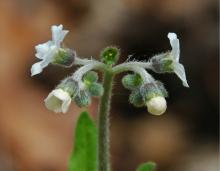Wildflowers, Grasses and Other Nonwoody Plants
Media

Species Types
Scientific Name
Euphorbia esula
Description
When you consider the negative effects this plant has on natural habitats, and how hard it is to control or eradicate, you almost want to rename it “leafy scourge”! This invasive plant is spreading in our state. Learn how to identify it.
Media

Species Types
Scientific Name
Phytolacca americana
Description
A tall, smooth, branching plant with red stems and juicy, dark purple berries, pokeweed is both toxic and a traditional edible potherb called poke salat. It is common statewide.
Media

Species Types
Scientific Name
Datura stramonium
Description
Pretty but poisonous, jimsonweed has white goblet-shaped flowers that open around midnight. This native of tropical America was introduced nearly throughout the United States and thrives in disturbed soils.
Media

Species Types
Scientific Name
Cynoglossum virginianum
Description
Wild comfrey has large basal leaves that are soft, hairy, and elliptical with long petioles — they look like hounds’ tongues! The upright flowering stalk has few leaves and looks like a wand.
Media

Species Types
Scientific Name
Euphorbia corollata
Description
With widespread sprays of small white flowers, flowering spurge looks a lot like the "baby's breath" so popular with florists. Each little "flower" has 5 white false petals surrounding a cup of tiny yellow male flowers and a single female flower.
See Also
About Wildflowers, Grasses and Other Nonwoody Plants in Missouri
A very simple way of thinking about the green world is to divide the vascular plants into two groups: woody and nonwoody (or herbaceous). But this is an artificial division; many plant families include some species that are woody and some that are not. The diversity of nonwoody vascular plants is staggering! Think of all the ferns, grasses, sedges, lilies, peas, sunflowers, nightshades, milkweeds, mustards, mints, and mallows — weeds and wildflowers — and many more!





















